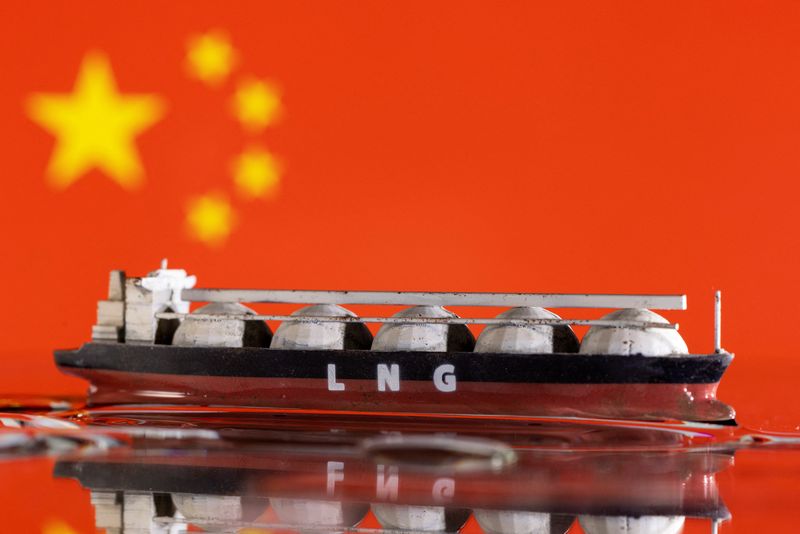By Chen Aizhu, Emily Chow and Marwa Rashad
SINGAPORE/LONDON (Reuters) - China's liquefied natural (LNG) gas importers are starting up or expanding trading desks in London and Singapore to better manage their growing and diversified supply portfolios in an increasingly volatile global market.
The beefed-up trading presence of Chinese importers puts them in direct competition with such global heavyweights as Shell PLC (LON:SHEL), BP (NYSE:BP), Equinor and TotalEnergies (EPA:TTEF) for a market that the International Energy Agency says doubled in value to $450 billion last year.
About a dozen Chinese companies have been expanding trading teams or adding new desks, with privately run ENN Natural Gas and state-run China National Offshore Oil Corp (CNOOC (NYSE:CEO)) the latest to plan London offices, and utility China Gas Holdings (OTC:CGHLY) setting up a Singapore operation, company officials and traders said.
Chinese gas importers have also boosted long-term LNG contracts with Qatar and U.S. suppliers by nearly 50% since late 2022 to more than 40 million metric tons per year (mtpy), with plans to add more volumes from those two countries, as well as from Oman, Canada and Mozambique, traders and analysts said.
"We're going to see a paradigm shift in Chinese companies from being total net importers to (being) more international and domestic trading players," said Toby Copson, Shanghai-based head of global trading for Trident LNG.
Already, state-run PetroChina, Sinopec (OTC:SHIIY), Sinochem Group and CNOOC are actively trading volatility to capitalise on their long portfolios, Copson said.
China vies with Japan to be the world's largest LNG importer, although it's not clear how much surplus or other volumes Chinese companies might have available to trade.
PetroChina International (PCI), trading arm of PetroChina and China's largest gas trader with a 100-strong global team in Beijing and four other international offices, imported or traded about 30 million tons of LNG last year.
Zhang Yaoyu, PCI's global head of LNG trading, declined to comment on the company's traded volume, but said trading was part of the company's overall strategy.
"Supply security is still at the heart of our business activities. Trading capability is one of the enablers ... to help us better deal with market swings," Zhang said.
By 2026, Chinese companies are expected to have contracted LNG supplies of more than 100 million tons a year. That could mean a surplus of up to 8 million tons that year, according to consultancy Poten & Partners, or a deficit of 5 million to 6 million tons based on estimates from pricing agency ICIS.
Either way, China's growing domestic output and more piped gas from Central Asia and Russia provide enough of a fuel base that Chinese gas companies can trade or swap U.S. and other portfolio cargoes when arbitrages open or it makes market sense.
"I could see China becoming a seasonal seller to places like Southeast Asia, South Korea and Japan, as well as into Europe," said Jason Feer, head of business intelligence at Poten & Partners.
U.S. LNG contracts are done on a free-on-board (FOB), open basis with no restrictions on destination, and consultant Rystad Energy estimates U.S. volume will make up a quarter of China's long-term contracts by 2030.
Qatar, which will be China's largest supplier for 2026, however, offers traditional LNG contracts that are restricted to a single destination or country.
BIG PUSH IN A SHIFTING MARKET
Russia's invasion of Ukraine last year forced European buyers to raise LNG imports by two-thirds to replace lost Russian piped gas. This created an outlet for companies with available supplies, and Chinese, Japanese and South Korean companies pounced as global LNG prices surged and the value of the market doubled.
European users have also been reluctant to sign long-term contracts because of decarbonisation goals, and Asian gas traders and importers have been sending LNG to Europe during spring and summer to fill storage tanks there, Feer said.
PCI as well signed a deal in May to use Rotterdam's Gate regasification terminal for 20 years, a first for a Chinese company in Europe.
These openings in the market and a more liberalised domestic gas market have also prompted smaller Chinese gas distributors and importers to expand into the trading space.
China Gas Holdings, for instance, which has signed contracts for 3.7 million tons per year for U.S. LNG, is hiring its first two traders for a new office in Singapore and is looking to secure more contracts, a company executive told Reuters.

It joins ENN, Beijing Gas, Zhejiang Energy and JOVO Energy in establishing a trading presence in the Southeast Asian energy hub.
"Compared to Japanese firms, Chinese are way more aggressive in expansion, with PCI and Unipec among the best payers offering comparable packages as the global majors," as they look to fill out trading desks, said a Singapore-based recruiter.